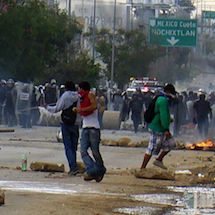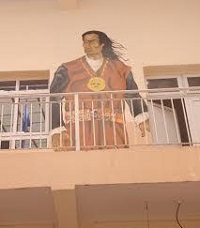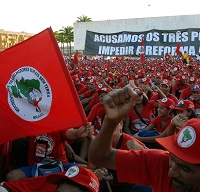|
Written by Gustavo Esteva
|
|
Friday, 24 June 2016 08:38 |
|

This is not just another of the many Oaxacan wars. It is part of a much more profound and extensive war that is by no means contained within the national territory itself. But the battle being waged in Oaxaca has a special meaning in that war, in the larger war.
|
|
Written by Raúl Zibechi
|
|
Tuesday, 21 June 2016 12:12 |
|
 The impeachment process against President Dilma Rousseff resulted from the conjunction of three factors: the rupture of the alliance with business owners, the rise of a new militant right, and the PT’s serious mistakes after abandoning the streets. What remains is a wounded society and an extractive model that went unquestioned by the left and undermined the hegemony of the Lula current. The impeachment process against President Dilma Rousseff resulted from the conjunction of three factors: the rupture of the alliance with business owners, the rise of a new militant right, and the PT’s serious mistakes after abandoning the streets. What remains is a wounded society and an extractive model that went unquestioned by the left and undermined the hegemony of the Lula current.
|
|
Written by Manuel Matos
|
|
Saturday, 18 June 2016 14:35 |
|

Over the past week, hundreds of black women from the region of Northern Cauca, in southwestern Colombia have been participating in the National Inter-Ethnic Agrarian Protest. For the sisters of the Black Women’s Mobilization for the Care of Life and the Ancestral Territories their decision to participate in the national protest was an act of Revolutionary Mothering.
|
|
Written by Nadine Sofia Brennan-Ventura
|
|
Saturday, 18 June 2016 13:17 |
|
 Tupac Amaru Neighborhood Association is named after Tupac Amaru II, the indigenous leader of the 1781 rebellion in Cuzco, Peru against the Spanish colonizers. The Tupac was formed 16 years ago in the context of severe unemployment and hunger brought by neoliberal policies that especially affected the province of Jujuy. Tupac Amaru Neighborhood Association is named after Tupac Amaru II, the indigenous leader of the 1781 rebellion in Cuzco, Peru against the Spanish colonizers. The Tupac was formed 16 years ago in the context of severe unemployment and hunger brought by neoliberal policies that especially affected the province of Jujuy.
|
|
Written by Toby Hill
|
|
Monday, 16 May 2016 12:08 |
|
 The closing down of a community-run radio in eastern rural Paraguay is the last example of repression in a country where 1,6% of its population controls 80% of its agricultural land. The closing down of a community-run radio in eastern rural Paraguay is the last example of repression in a country where 1,6% of its population controls 80% of its agricultural land.
|
|
Written by George Ygarza
|
|
Sunday, 08 May 2016 11:20 |
|
 Lourdes Huanca Atencio is president of the National Federation of female peasants, Artisans, Indigenous, Natives and Salaried workers of Peru or FENMUCARINAP. The organization was founded in 2006 with the purpose of defending and fighting for the rights of women in Peru. Lourdes Huanca Atencio is president of the National Federation of female peasants, Artisans, Indigenous, Natives and Salaried workers of Peru or FENMUCARINAP. The organization was founded in 2006 with the purpose of defending and fighting for the rights of women in Peru.
|
|
Written by Ryan A. Knight
|
|
Thursday, 21 April 2016 21:27 |
|
 The authorities of the state of Mexico have grown impatient, or perhaps even fearful. Faced with the well-organized and constantly growing resistance to countless megaprojects in the state of Mexico—projects driven by the ruthless pursuit of capital accumulation—political authorities have sought justification and legal protection to violently repress the resistance and see these projects through. The authorities of the state of Mexico have grown impatient, or perhaps even fearful. Faced with the well-organized and constantly growing resistance to countless megaprojects in the state of Mexico—projects driven by the ruthless pursuit of capital accumulation—political authorities have sought justification and legal protection to violently repress the resistance and see these projects through.
|
|
Written by Nidia Bautista
|
|
Wednesday, 13 April 2016 19:00 |
|
 Two and a half years after she was thrown into a Mexican federal penal facility, arrested without a warrant and charged with kidnapping, indigenous community police leader Nestora Salgado was freed from Tepepan Women’s Social Rehabilitation Center in Mexico City mid-March. Two and a half years after she was thrown into a Mexican federal penal facility, arrested without a warrant and charged with kidnapping, indigenous community police leader Nestora Salgado was freed from Tepepan Women’s Social Rehabilitation Center in Mexico City mid-March.
|
|
|
Written by National Indigenous Congress and EZLN
|
|
Wednesday, 22 June 2016 07:05 |
|
 Faced with the cowardly repressive attack suffered by the teachers and the community in Nochixtlán, Oaxaca—in which the Mexican state reminds us that this is a war on all—the peoples, nations, and tribes who make up the National Indigenous Congress and the Zapatista Army for National Liberation say to the dignified teachers that they are not alone, that we know that reason and truth are on their side, that the collective dignity from which they speak their resistance is unbreakable, and that this the principal weapon of those of us below. Faced with the cowardly repressive attack suffered by the teachers and the community in Nochixtlán, Oaxaca—in which the Mexican state reminds us that this is a war on all—the peoples, nations, and tribes who make up the National Indigenous Congress and the Zapatista Army for National Liberation say to the dignified teachers that they are not alone, that we know that reason and truth are on their side, that the collective dignity from which they speak their resistance is unbreakable, and that this the principal weapon of those of us below.
|
|
Written by Jeff Abbott
|
|
Saturday, 18 June 2016 14:35 |
|
 On June 9, Ana Mirian Romero, a 29-year-old indigenous Lenca woman and mother of five from the department of La Paz, Honduras, was recognized by the European human rights organization Front Line Defenders. Romero was awarded the organization’s annual award for Human Rights Defenders for her work struggling for the recognition of indigenous lands and against the corporate destruction of the environment in Honduras. On June 9, Ana Mirian Romero, a 29-year-old indigenous Lenca woman and mother of five from the department of La Paz, Honduras, was recognized by the European human rights organization Front Line Defenders. Romero was awarded the organization’s annual award for Human Rights Defenders for her work struggling for the recognition of indigenous lands and against the corporate destruction of the environment in Honduras.
|
|
Written by Jeff Abbott
|
|
Saturday, 18 June 2016 13:53 |
|
 The long-running struggle of rural communities in Guatemala against the United States-based mining firm Kappes, Cassiday, and Associates (KCA) continues in Guatemala’s national courts. A recent investigation by the Guatemalan public ministry could come with criminal charges for executives of the controversial gold mine. The long-running struggle of rural communities in Guatemala against the United States-based mining firm Kappes, Cassiday, and Associates (KCA) continues in Guatemala’s national courts. A recent investigation by the Guatemalan public ministry could come with criminal charges for executives of the controversial gold mine.
|
|
Written by Jeff Abbott
|
|
Monday, 16 May 2016 15:30 |
|
 Guatemala's war and counter-insurgency have continued through other means. Today social and indigenous movements face free speech and legal challenges that threaten to tear them apart by dismantling leadership and organizational structures, and sending movement bases into disarray. Guatemala's war and counter-insurgency have continued through other means. Today social and indigenous movements face free speech and legal challenges that threaten to tear them apart by dismantling leadership and organizational structures, and sending movement bases into disarray.
|
|
Written by MST
|
|
Monday, 16 May 2016 11:37 |
 Brazil’s Landless Workers' Movement, MST, takes a profound look at Brazil's political crisis, how it affects the working class, and how they must respond. Brazil’s Landless Workers' Movement, MST, takes a profound look at Brazil's political crisis, how it affects the working class, and how they must respond.
|
|
Written by Jeff Abbott
|
|
Friday, 29 April 2016 10:59 |
|
 “Water is life” is the message that countless organizations across Guatemala have rallied around as thousands march more than 260 miles to demand that the Guatemalan government act, and protect right to water. Tens of thousands of protesters set out on the long, and grueling march to Guatemala City on April 11 to demand that the government protect their right to water, and for an end to the privatization of water resources. “Water is life” is the message that countless organizations across Guatemala have rallied around as thousands march more than 260 miles to demand that the Guatemalan government act, and protect right to water. Tens of thousands of protesters set out on the long, and grueling march to Guatemala City on April 11 to demand that the government protect their right to water, and for an end to the privatization of water resources.
|
|
Written by Beverly Bell
|
|
Thursday, 21 April 2016 19:41 |
|
 Fifteen hundred people from at least 22 countries convened in Honduras from April 13-15, 2016 for the "Peoples of ¡Berta Vive!" International Gathering. They came to honor slain global movement leader Berta Cáceres and to commit themselves to keeping her legacy alive. Fifteen hundred people from at least 22 countries convened in Honduras from April 13-15, 2016 for the "Peoples of ¡Berta Vive!" International Gathering. They came to honor slain global movement leader Berta Cáceres and to commit themselves to keeping her legacy alive.
|
|
Written by Jeff Abbott
|
|
Friday, 08 April 2016 19:12 |
|
 On February 10, 2015, thousands of indigenous campesinos from across Guatemala associated with the Committee for Campesino Development (CODECA) took to the streets of Guatemala City in the first large march of the administration of Jimmy Morales. The campesinos were continuing a decade-long struggle to demand that the Guatemalan government nationalize the electrical system. On February 10, 2015, thousands of indigenous campesinos from across Guatemala associated with the Committee for Campesino Development (CODECA) took to the streets of Guatemala City in the first large march of the administration of Jimmy Morales. The campesinos were continuing a decade-long struggle to demand that the Guatemalan government nationalize the electrical system.
|
|

